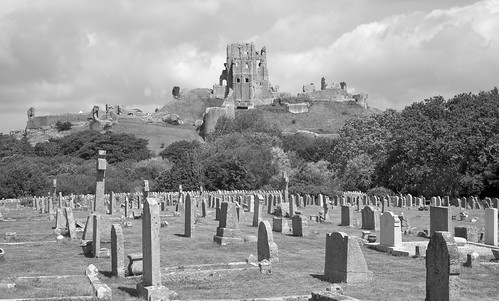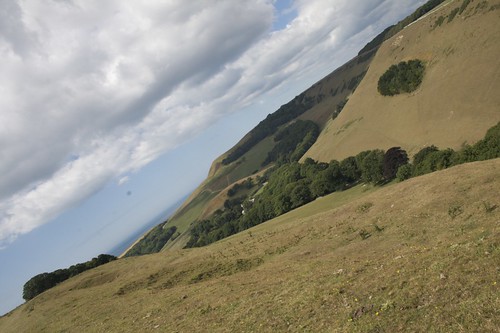But let's back up to yesterday afternoon, one p.m. or so, Day Four, Adam planting along there in the rain and right now he hates it. It's awful. He's miserable, and wishing that anything, anything at all would happen to get him out of here. And again, as always, the same thought that, if he's out of here, where would he go? And then, again, as always, the counter-thought that said I don't care, I'll figure something out, just get me the fuck out of here, please just somehow get me out of here.
Rain. He tries to plant a tree. It doesn't work. He tries again and not surprisingly, it doesn't work again. His mind wanders as he pokes for spots with his shovel. He's nine years old and playing hockey, his one and only experience, ever, in any kind of organized sports. He knows he doesn't quite fit in. For one thing, he doesn't even really like hockey, but some of the other kids don't as well. So it's not just that. It's mostly about money. He's one of only a couple of kids on the team who lives in West Broadway, while most of the kids he plays with live in Wolseley, a significantly more upscale nieghborhood than his, or else they live across the river in the big mansions on Academy and on Wellington, the real old-money neighborhoods of Winnipeg.
Most of the other kids don't come from poor, single-parent families like he does. Their parents are lawyers, and serve on the boards of symphonies and art magazines. So there's that, too, plus the fact that their skates are new and shiny, sleek molded black plastic, while his are old leather hand-me-downs, and look like they belong in a museum.
He remembers that first practice, a few of the rich kids standing there on the ice whispering to each other, snickering at his crappy old skates, the way groups form, the fearful in-clustering that happens against some perceived and outside threat.
But he's been practicing the last few weeks, and practicing hard, even though he's hopeless at sports. He's been there, alone at nights on the outdoor rink at the end of Lipton Street, by the river with all the lights turned off, just him skating around in the godlike and forever darkness of a Winnipeg winter night, shooting a puck at an empty net over and over, trying to get better at this. Not sure why he has to, just knowing that he feels like he should.
Cut now to a game now, and it's a yellow-brilliant white-blue day, the kind of day that only a northern winter can produce, the air so bright and so cold that it seems to sparkle and snap there in the sunlight. He's squinting through his glasses and tottering along the ice now, trying to think of what he was practicing all those dark nights on the rink. Parents hang over the boards yelling encouragement and clutching jumbo coffees in their mittened hands, the referee is lean and striped on his skates, the action is far down the ice but Adam is hurrying to catch up to it, trying, when suddenly it changes direction and zips past him in a blur of green jerseys and a blur black jerseys, all of them going the other way.
He follows the play to the corner, catches up to it and he's mad, and doesn't quite know why. He pushes another kid, a smaller kid, just because he's mad. Later, even years later when he thought about it still, he feels worse about that than he does about his rather poor showing in sports.
But it's raining again. He's back on the clear-cut. He pokes the ground with his shovel, tires to get a tree in, and it doesn't quite work. He pokes the ground with his shovel again, looks up the hill at the far-away forest, at the clouds, at forever the clouds, and he sighs.
Later that same day and his mind wanders across old TV commercials again, forgotten songs, and then he remembers visiting his mom at work, just around the corner from their place on Cornish Avenue. It's a small local deli where they served sandwiches and pickles and beer in big, cheap pitchers, where there was never any shortage of regulars to drink during the day and to drink during the night. Different crowds, though--the day crowd is a bit older, sadder--unemployed people in threadbare Salvation Army clothes, drinking beer in mis-matching coffee cups. The night-time crowd is younger, more hip, Salvation Army clothing too, but wannabe revolutionaries with Che Guevara t-shirts and army jackets and small green hats with a red commie star pin. But there he is with his sister, visiting his mom at work, on a sunny fall afternoon and he's ten here, maybe, or eleven, which would make his sister seven.
She's mopping the floor when they come in. Three old ladies in white sit in the corner knitting. Silently. Two old men, also silent, each sit at their own tables, each of them alone, not talking to each other, drinking beer. The boss is angry at Adam's mom for some reason, he can't remember why now, and as Adam walks in the door, he's yelling at her that he'll just have to find someone else and see how she likes that. She's apologizing as she mops. Sorry, she says, sorry, sorry.
They see Adam and the boss stops, breaks off, shakes his head, then adds I'm serious Nelly. I know, she says. He picks up some empty cases of beers and walks downstairs, while she brushes a strand of her hair off her face, smiles at them.
Hello my little Prince and Princess, she says, but without much conviction this time, something a bit sad and defeated about it, her eyes with that flatness about them, but hugs the kids anyway and sits them at a table looking out the window. She gives them a coke and some fries to share and they eat them with ketchup, dipping them and chewing slowly, thoughtfully, looking outside while their mom finishes mopping.
The three women in the corner with their pots of tea are still silent, still knitting. They look over towards the kids, needle-hands still turning the wool, still turning. They're beautiful, one of the old women says, almost silently, to the other two.
They will suffer so much, the second woman says, even more silently.
But life will repay them, the third says. It will give back to them for all it takes. And they nod, the three, continue knitting, near-blind eyes turned outward to the sunlight past the children's heads.
Adam, Chloe and their mother leave the deli together, out then in the burgundy-fall day and she takes their hands and they walk on in silence. Orange and yellow leaves are scattered along the banks of the Assiniboine just past their place at the end of Cornish now, and as they stroll along quietly it feels like a Neil Young song should be playing over this whole scene, Helpless or something, some kind of song about a small northern city, a place where the winters were so cold and the summers so heart-breakingly short, a place where things could bloom so briefly into life-full colour and then turn grey again, become dust.
You're pretty, mom, Chloe says.
So are you, Princess, their mom says.
Rain on the clear-cut again and Nelly, Adam thought. Her name was Lillian, and all her life that's what everyone called her. Only the people here at the deli, and the boss, especially, called her Nelly for some reason.
Weird, Adam thinks now all these years later in the rain, his thoughts still wandering.
Weird. Why Nelly?










